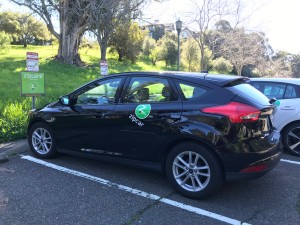Beginning Jan. 31, Mills College students, faculty, staff and alums can join Zipcar at a discounted rate and access two Zipcar vehicles located on-campus in the Richards Parking Lot near the Security Gate.

“I was hoping that they’d have Zipcar before [Mills] did,” Mills student Liza Mohamath said. “[The campus] had it at my last school in Seattle.”
Nationally, car-sharing usage has been increasing year over year. UC Berkeley researchers Susan Shaheen and Adam Cohen found that car-sharing memberships increased by 86.9 percent from 2007 to 2017.
Of those who filled out the Mills transportation survey in the 2017–2018 academic year, about 18.9 percent of parking permit applicants have used a car-sharing service. The survey question asked participants to check all that apply among Zipcar, Turo, Getaround and none of the above. The Mills transportation survey is filled out when applying for a parking permit and about 42 percent of the campus community has not filled it out.
“Alternative modes of transportation are useful and would apply under our plan,” Joanne Wong, Mills’ sustainability coordinator, said. “That gave us more reason to move on [a Zipcar] program.”
The addition of a car-share on-campus aligns with the Mills College Climate Action Plan (CAP) – 2025. The current CAP is based on input from students, faculty and staff and targets a 40 percent reduction in campus carbon emissions from 2008 levels by 2025. This is from Mills pledge for the American College and University Presidents’ Climate Commitment (ACUPCC). To help reach its goals, CAP identifies reducing single occupancy vehicle (SOV) commutes as a factor to decrease emissions since it accounted for 28 percent of campus emissions in fiscal year 2016.
Zipcar estimates that each member reduces their carbon footprint, on-campus and on the roads, by up to 1,600 pounds per year. Furthermore, CAP estimates that a car-share on campus equals an annual reduction of round trip SOV trips by 7,000.
“I think we have a responsibility, an ethical responsibly, to care for our earth and our resources just as much as you care for yourself,” Wong said. “When you care for the earth and you are practicing more sustainable practices you are caring for your well-being and the people that you love. So, it’s very cyclical and it comes back.”
She also said that having a personal car on campus can be costly for students, especially if it is only used occasionally. Therefore, a Zipcar membership could help students save money while maintaining access to a vehicle.
In 2018, the average cost to own and operate a car is $8,849 per year, according to The American Automobile Associations (AAA). The figure is calculated based on the cost of fuel, maintenance, repairs, insurance, license/registration/taxes, depreciation and loan interest.
“The first Zipcar ride was pretty cool,” Mahamath said. “I took a couple of friends to Emeryville and it went pretty smoothly I would say.”
Moreover, Zipcar reports that most of their college members maintained or increased their usage of other transport options. For example, 81 percent biked the same or more after joining and more than 86 percent walked the same or more.
“I think a lot more people these days are interested in maybe mixing up their commute with biking a little, BARTing a little, taking AC Transit, taking ride-share,” Wong said. “Now car-share is available for some of those bigger trips and you don’t have the burden of owning and maintaining a car.”
Zipcar, and car-shares in general, also help to lessen carbon emissions through the reduction of car purchases. For example, in a 2016 academic study of Zipcar’s college market, researchers at UC Berkeley found that 43 percent of university Zipcar members sold or put off buying a car. Another 40 percent of participants are less likely to buy car in the next few years due to their membership.
For students between the ages of 18 to 20, Zipcar membership is only available through their college partnerships.
To join Zipcar, the rate for members of the Mills community is $15 and then $25 for each year thereafter. The cost to reserve a Zipcar vehicle begins at $9.75 per hour or $79 per day. Gas, insurance, maintenance and 180 miles per day are included in the reservation fee.
For comparison, non-Mills members would pay a rate of $70 per year or $7 per month, with a one-time $25 application fee.
In addition to the two Zipcars on-campus, student and Mills-affiliated members have access to the thousands of vehicles in over 500 cities and towns across nine countries. Conversely, other Zipcar members, outside of Mills, can also reserve the Zipcars in the Richards Parking Lot.
Considered a leading car-sharing network, Zipcar is the largest provider of campus car-sharing programs. There are over 600 Zipcar on-campus programs. Their stated mission is to enable simple and responsible urban living on college campuses and in cities across the globe.
This partnership is currently a one-year pilot program. More details on joining and eligibility are available at zipcar.com/mills.
